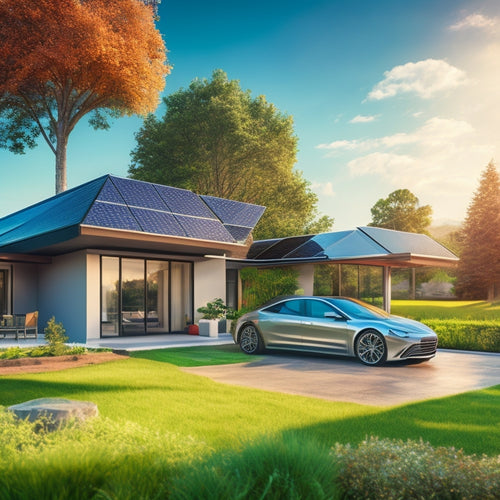
10 Best Reasons You May Need Permits for Panels
Share
You may need permits for your solar panels to make sure electrical connections meet local building codes, and your roof can support the added weight. You'll also need to comply with neighborhood association rules, local ordinances, and zoning laws. Additionally, you'll need to take into account insurance and liability concerns, fire safety, environmental hazards, and property value impact. Without permits, you may face costly rework, legal consequences, and decreased property resale value. To avoid these issues, it's essential to understand the permitting process, and by exploring further, you'll discover the essential steps to a successful solar panel installation.
Key Takeaways
• To ensure compliance with local building codes and regulations, permits are necessary for solar panel installations.
• Permits verify that solar panels are installed safely and efficiently, preventing electrical hazards and fires.
• Without permits, property owners risk fines, penalties, and legal action, which can impact property resale value.
• Permits guarantee that solar panels are installed with proper structural support, preventing roof damage and collapse.
• Obtaining permits helps maintain property value by ensuring compliance with local ordinances and zoning laws.
Electrical Connection Requirements
When installing solar panels, you need to make sure that the electrical connection meets the local building codes and regulations, which often require permits to verify compliance. This is important because a faulty electrical connection can lead to voltage drops, reducing the overall efficiency of your solar panel system.
You want to guarantee that current flows smoothly and efficiently from your panels to your inverter and eventually to your home's electrical grid. To achieve this, you'll need to comply with local electrical codes, which may require permits. These permits ensure that your solar panel system is installed and connected correctly, minimizing the risk of electrical shock, fires, or other hazards.
Roof Structure and Integrity
When you're planning to install panels, you need to take into account the roof's structural load capacity to make sure it can support the added weight.
You'll also need to evaluate the roof deck's durability and its ability to withstand the weight distribution impact of the panels.
Structural Load Capacity
Your roof's structural load capacity plays a vital role in determining whether it can safely support the added weight of solar panels, as well as withstand external factors like snow, wind, and seismic activity. A thorough assessment of your roof's structural load capacity is essential to guarantee the safe installation of solar panels. This involves evaluating the strength and durability of your roof's beams and frames.
| Structural Component | Testing Method | Acceptable Threshold |
|---|---|---|
| Roof Beams | Beam strength analysis | 10,000 lbs/sq ft |
| Roof Frames | Frame durability testing | 5,000 lbs/sq ft |
| Roof Decking | Compression testing | 2,000 lbs/sq ft |
| Fasteners | Tensile strength testing | 1,500 lbs/sq ft |
Roof Deck Durability
After evaluating your roof's structural load capacity, you must assess the roof deck's durability, as it directly affects the overall integrity of your roof structure.
A durable roof deck is essential to guarantee the longevity of your roof and prevent potential hazards. You'll need to examine the deck's weather resistance, which is vital in withstanding harsh environmental conditions.
A roof deck that can withstand extreme weather conditions will minimize the risk of damage and reduce the need for frequent repairs.
Regular deck maintenance is also important to extend the lifespan of your roof deck. This includes inspecting the deck for signs of wear and tear, addressing any damage promptly, and performing routine cleaning to prevent debris accumulation.
By doing so, you can prevent water seepage, reduce the risk of roof collapse, and ensure the structural integrity of your roof remains intact.
Weight Distribution Impact
Proper weight distribution is essential to maintaining your roof's structural integrity, as unevenly distributed loads can compromise the entire roof structure. When you add solar panels to your roof, you're introducing additional weight that can affect the distribution of loads. This is where load calculations come into play. You need to make sure that your roof can handle the added weight of the panels, taking into account factors like wind resistance and snow loads.
Structural dynamics play a critical role in determining the impact of weight distribution on your roof. You need to take into account the roof's structural elements, such as beams and trusses, and how they'll respond to the added weight. Improper weight distribution can lead to roof sagging, cracking, or even collapse.
To avoid these issues, you'll need to conduct detailed load calculations and consult with structural engineers or architects to confirm that your roof can handle the additional weight.
Building Code Compliance Issues
When installing panels, you'll need to make sure that your project meets local building codes and ordinances. You'll need to confirm that your installation complies with these regulations to avoid costly rework or even removal.
Code Requirements Met
It's important to verify that your solar panel installation complies with local building codes, which involve specific requirements for structural integrity, electrical connections, and fire safety. You'll need to make sure that your installation meets these standards to avoid costly rework or even fines.
Aesthetic compliance is also vital, as your installation must blend in with the surrounding architecture and landscape. Municipal standards dictate that your solar panels shouldn't obstruct sidewalks, roads, or other public spaces.
Meeting code requirements is essential to guarantee the safety of people and property. Electrical connections must be secure, and fire safety measures must be in place to prevent electrical fires. You'll need to adhere to local ordinances and regulations, which may vary depending on your location.
Local Ordinance Compliance
In addition to meeting national building codes, you must also comply with local ordinances that dictate specific requirements for solar panel installations, which can vary greatly from one jurisdiction to another. These ordinances can be complex and nuanced, making it vital to understand the local regulations governing solar panel installations in your area.
Zoning inconsistencies can be a significant hurdle in the permitting process. For instance, some jurisdictions may have specific rules regarding the size, placement, and design of solar panels. Failure to adhere to these regulations can lead to costly revisions or even project cancellation.
Community engagement plays a key role in ensuring that your solar panel installation meets local ordinance requirements. It's crucial to engage with local authorities, neighbors, and other stakeholders to ensure that your project aligns with community expectations and zoning regulations. By doing so, you can avoid potential conflicts and ensure a smoother permitting process.
Neighborhood Association Rules
Your neighborhood association's rules, known as covenants, conditions, and restrictions (CC&Rs), may prohibit or restrict the installation of solar panels on your property. These rules are put in place to maintain the aesthetic appeal and property values of the community.
Before installing solar panels, you should review your neighborhood's CC&Rs to ensure compliance. Here are some potential restrictions to take into account:
-
Architectural style: Your neighborhood may have specific guidelines for the design and appearance of solar panels, ensuring they blend in with the existing architecture.
-
Landscaping restrictions: You may need to maintain a certain level of landscaping around your property, which could impact the placement and visibility of your solar panels.
-
Roofing material compatibility: Your neighborhood may require solar panels to be installed on roofs made of specific materials, such as asphalt shingles or clay tiles.
- Panel color and visibility: Some neighborhoods may restrict the color or visibility of solar panels to maintain a uniform appearance.
Remember to review your CC&Rs carefully to avoid any potential issues with your neighborhood association.
Insurance and Liability Concerns
When installing solar panels, you must consider the potential impact on your insurance coverage and liability exposure. A comprehensive risk assessment is vital to identify potential gaps in your policy. You may need to update your policy to cover the new installation, making sure you're protected in case of damage or accidents.
It's essential to review your policy to identify any policy gaps that may leave you vulnerable to unforeseen risks. For instance, you may need to increase your liability coverage to account for the added risk of having solar panels on your property. Additionally, you should verify that your policy covers damage to the panels themselves, as well as any potential electrical or fire hazards.
Failing to address these concerns can lead to costly surprises down the line. By conducting a thorough risk assessment and reviewing your policy, you can ensure you're adequately protected and avoid potential financial burdens.
Don't assume your existing policy is sufficient; take the time to review and update your coverage to make sure you're fully protected.
Utility Company Interconnection
Before installing solar panels, you'll need to navigate the utility company's interconnection process, which involves coordinating with your utility provider to guarantee a safe and efficient connection to the grid. This process verifies that your system meets the utility company's technical and safety requirements, allowing you to safely feed excess energy back into the grid and offset your energy consumption.
Here are some key considerations for the interconnection process:
-
Grid Parity: Your utility company will assess whether your system can operate in parallel with the grid, ensuring a smooth shift between grid power and your solar-generated power.
-
Metering Options: You'll need to decide on a metering configuration that accurately measures your energy production and consumption, such as a bi-directional meter or a net meter.
-
Technical Requirements: Your system must meet the utility company's technical standards, including voltage, frequency, and power quality requirements.
- Safety Certifications: Your system must comply with relevant safety certifications, such as UL (Underwriters Laboratories) or IEEE (Institute of Electrical and Electronics Engineers) standards.
Local Ordinances and Zoning Laws
In addition to meeting utility company requirements, you'll need to comply with local ordinances and zoning laws, which govern the installation and appearance of solar panels in your area. These regulations vary by municipality, but they often focus on aesthetic standards, making sure that solar panels blend in with the surrounding architecture. For instance, you may need to obtain a permit to install solar panels in a historic district, where Historic preservation is a top priority. Local ordinances may dictate the color, size, and material of your solar panels to maintain the area's original charm.
You'll need to research and abide by local zoning laws, which dictate the placement and orientation of your solar panels. For example, you may need to ensure that your solar panels don't obstruct sidewalks, roads, or neighboring properties. Failure to comply with local ordinances and zoning laws can result in fines, penalties, or even the removal of your solar panel system.
To avoid these issues, it's crucial to familiarize yourself with local regulations and obtain the necessary permits before installing your solar panels. By doing so, you'll guarantee a smooth and successful installation process.
Fire Safety and Emergency Access
When installing panels, you'll need to make sure that your setup meets fire safety and emergency access standards.
This means you'll have to take into account factors like emergency escape routes, fire-resistant materials, and clearance from combustible materials.
Emergency Escape Routes
It's important to make sure that your solar panel installation doesn't obstruct emergency escape routes, as doing so can hinder firefighters' access and put people's lives at risk in the event of a fire or other emergency. You must guarantee that your solar panels don't block doors, windows, or any other means of egress. This is vital in developing a safe exit strategy, providing a clear and safe passage for occupants to evacuate the premises quickly.
When planning your solar panel installation, keep the following in mind:
-
Maintain clear access to all doors and windows, ensuring that occupants can exit quickly in an emergency.
-
Keep escape routes clear of any obstructions, including solar panels, to prevent hindering evacuation.
-
Ensure safe passage by avoiding installations that could block or impede escape routes.
- Consult local building codes to guarantee compliance with regulations regarding emergency escape routes.
Fire-Resistant Materials Used
You must select fire-resistant materials for your solar panel installation to guarantee they don't contribute to the spread of fire or hinder firefighter access during an emergency. This is a vital aspect of ensuring fire safety and emergency access. When selecting materials, consider those with built-in flame retardants, which can slow or stop the spread of fire.
| Material | Flame Retardant Properties |
|---|---|
| Polyvinyl Fluoride (PVF) | High resistance to ignition and flame spread |
| Polyethylene (PE) | Moderate resistance to ignition, high resistance to flame spread |
| Polypropylene (PP) | Low resistance to ignition, moderate resistance to flame spread |
| Fiberglass-reinforced polyester (FRP) | High resistance to ignition and flame spread |
Material selection is important in preventing fires from spreading quickly. By choosing materials with inherent flame retardant properties, you can reduce the risk of fire hazards and make sure that your solar panel installation meets fire safety standards. Remember, prioritizing fire safety and emergency access is crucial when designing and installing your solar panel system.
Clearance From Combustibles
Proper clearance from combustibles is vital to prevent fires from spreading rapidly and to guarantee firefighters' safe access during emergencies. As you plan to install solar panels, you must make sure that your installation meets the necessary clearance requirements to minimize fire hazards and smoke risks.
Here are some key considerations to keep in mind:
-
Vegetation clearance: Maintain a safe distance between your solar panels and surrounding vegetation to prevent fires from spreading.
-
Roof clearance: Ensure that your solar panels are installed at a safe distance from roof edges, vents, and other combustible materials.
-
Electrical clearance: Keep electrical components, such as inverters and wiring, away from combustible materials to reduce fire risks.
- Emergency access: Guarantee that firefighters have safe access to your roof and solar panels in case of an emergency.
Environmental and Health Hazards
Installing solar panels without permits can expose nearby ecosystems to environmental hazards, such as contaminated water sources or disrupted habitats, which can have devastating consequences for local wildlife.
As you consider installing solar panels, you must be aware of the potential environmental and health hazards that can arise from improper installation. Without proper permits, you risk releasing chemicals and heavy metals into the air, contributing to air pollution and negatively impacting local air quality.
In addition, improper installation can lead to water contamination, putting nearby water sources at risk of pollution. This can have severe consequences for both human health and the environment. You may unknowingly be exposing yourself, your family, and your community to harmful pollutants.
Property Value and Resale Impact
Failing to secure necessary permits for your solar panel installation can lead to a significant decrease in your property's resale value, as potential buyers may be deterred by the uncertainty surrounding the system's safety and compliance. This can ultimately affect your property's curb appeal, making it less attractive to potential buyers.
Here are 4 key factors to take into account:
-
Lack of compliance: Unpermitted solar panels can raise red flags during inspections, leading to costly rework or even removal.
-
Uncertainty and risk: Buyers may be hesitant to purchase a property with unpermitted solar panels, perceiving them as a liability.
-
Reduced resale potential: Unpermitted solar panels can decrease your property's resale value, making it harder to sell.
- Legal and financial implications: Failure to obtain necessary permits can result in fines, penalties, and even lawsuits.
Frequently Asked Questions
Can I Install Solar Panels on a Historic Building?
Coincidentally, you're considering solar panels for a historic building, where preserving architectural integrity is essential. You'll need to make sure that the installation complies with Historic Preservation guidelines to avoid altering the building's original character.
Are There Permits Required for Off-Grid Solar Systems?
When you're planning off-grid solar systems, you'll likely need permits, especially for rural installations in remote locations, where zoning laws and electrical codes still apply, even if you're not connecting to the grid.
Do Solar Panels Affect Homeowners' Association Rules?
As you navigate the solar landscape, beware of the HOA dragon, guarding CC&R restrictions. You'll need Architectural approval to install panels, lest you face a fiery battle, so research and comply to avoid a solar setback.
Can I Install Solar Panels on a Rented Property?
Before installing solar panels on a rented property, you'll need to obtain landlord approval, as specified in your rental agreements, ensuring you're not violating any terms and avoiding potential disputes.
Are There Permits Required for DIY Solar Panel Installation?
When you decide to install DIY solar panels, you'll likely need to obtain permits, as local regulations typically require electrical inspections to verify that your system meets safety and building codes.
Related Posts
-

What Solar Panels Work Best With EVS Online?
When shopping for solar panels online to power your electric vehicle, look for high-efficiency models that can withst...
-

Charging Points in Rural Areas: 5 Key Insights
When driving through rural areas, you'll face a shortage of charging points, making EV ownership stressful and inconv...
-

What You Need to Know About RV Solar Maintenance
When you're out on the road, your RV's solar panel system is your lifeline. But without regular maintenance, you're l...


